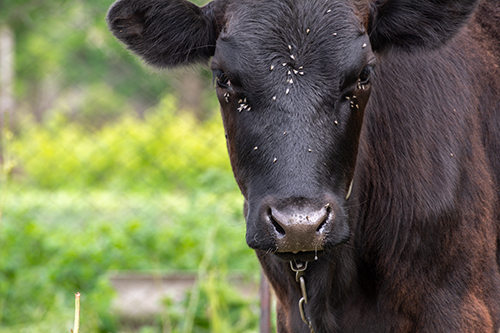Proper Fly Control
Mar 13, 2023

Lack of proper fly control can be quite costly in terms of lost production, treatment costs, and disease transmission, taking a significant toll on animals’ comfort and the operation’s bottom line.
The three major species for concern are houseflies, face flies, and horn flies. Fortunately, there are several effective options for controlling flies and minimizing their associated losses to cattle herds. Insecticide ear tags, pour-on products, back rubbers treated with insecticides, premise sprays, and feed-through insect growth regulators (IGRs) can all be of use in keeping fly numbers in check.
The most convenient method is a cattle vitamin-mineral supplement containing an IGR because this product eliminates the stress, labor, and expense of handling cattle while allowing the animals to spread the horn fly control as they graze.
Feed-through IGRs control horn fly populations by preventing the eggs from developing into adult flies. The compound is consumed and passes unaffected through the animal’s digestive tract, ending up in the manure where it interrupts the life cycle of the fly, preventing development into the adult stage. For optimum fly control, these products must be consumed daily in adequate quantities to ensure that all manure contains effective levels of the IGR.
For most effective results when using Co-op Fly Control Minerals, begin feeding before flies appear in the spring. A good rule of thumb is to offer the fly control mineral at least 30 days before the last frost in the spring and 30 days after the first frost in the fall. These minerals, in addition to fly control, are a complete vitamin-mineral supplement containing a feed-through insecticide and providing additional nutrients such as phosphorus, copper, zinc, and selenium. These nutrients are necessary for grazing cattle to get the most from the pastures they graze.
Consult with your local Co-op feed and animal health specialist to help set up an effective fly control plan.
For more content like this, check out the latest issue of The Cooperator.
The three major species for concern are houseflies, face flies, and horn flies. Fortunately, there are several effective options for controlling flies and minimizing their associated losses to cattle herds. Insecticide ear tags, pour-on products, back rubbers treated with insecticides, premise sprays, and feed-through insect growth regulators (IGRs) can all be of use in keeping fly numbers in check.
The most convenient method is a cattle vitamin-mineral supplement containing an IGR because this product eliminates the stress, labor, and expense of handling cattle while allowing the animals to spread the horn fly control as they graze.
Feed-through IGRs control horn fly populations by preventing the eggs from developing into adult flies. The compound is consumed and passes unaffected through the animal’s digestive tract, ending up in the manure where it interrupts the life cycle of the fly, preventing development into the adult stage. For optimum fly control, these products must be consumed daily in adequate quantities to ensure that all manure contains effective levels of the IGR.
For most effective results when using Co-op Fly Control Minerals, begin feeding before flies appear in the spring. A good rule of thumb is to offer the fly control mineral at least 30 days before the last frost in the spring and 30 days after the first frost in the fall. These minerals, in addition to fly control, are a complete vitamin-mineral supplement containing a feed-through insecticide and providing additional nutrients such as phosphorus, copper, zinc, and selenium. These nutrients are necessary for grazing cattle to get the most from the pastures they graze.
Consult with your local Co-op feed and animal health specialist to help set up an effective fly control plan.
For more content like this, check out the latest issue of The Cooperator.